The IMO remains firmly opposed to plans for pharmacist prescribing, citing ‘conflicts of interest’ among its concerns.
In August 2024, an expert taskforce recommended the implementation of pharmacist prescribing. The taskforce was convened by the Department of Health in 2023 to advise on expanding the remit of pharmacists.
Pharmacist prescribing would begin within a “common conditions service”. Over time, pharmacists should be enabled to exercise independent prescriptive authority within their individual scope of practice and competence.
Upon the report’s publication, taskforce Chair Dr Pat O’Mahony said it had reviewed the national and international evidence. The recommendations supported “enhanced patient access to prescription medicines in a safe, regulated way”. The interim Chief Medical Officer, Prof Mary Horgan, noted that common conditions services operated “very effectively” in many other countries.
The Irish Pharmacy Union welcomed the report, but advised that an “ambitious” implementation and funding plan would be required.
However, this month an IMO spokesperson told the Medical Independent (MI) it continues to have “serious” concerns about the plans. “The IMO is concerned that the transfer of tasks from doctors to pharmacists is unsupported by the evidence and has implications for patient safety, quality of care, healthcare sustainability, and fragmentation of care.”
The implication that pharmacist prescribing would help reduce demand on general practice showed “a profound misunderstanding” of the importance of continuity of care and risked “further fragmentation of care”.
The IMO also contended that a “clear” conflict of interest could arise when a healthcare professional incurred a financial gain from the medicine they prescribed.
“Patients and the State have always been well served by the separation of the prescriber (the doctor) and the dispenser (the pharmacist) role, as a clear conflict of interest can arise when a healthcare professional incurs a financial gain from the medicine they prescribe,” the IMO informed MI.
“Legislators and regulators must be compelled to recognise that a clear conflict of interest arises when a pharmacist takes on an expanded prescribing role, particularly given the growing number of retail pharmacy chains and the vertical integration of pharmaceutical wholesale distribution and pharmacy retail.”
Referencing concerns about ‘linked sales’ policies, the spokesperson continued: “Pharmacists frequently stock and sell vitamin supplements, homeopathic remedies and other products of limited or no proven therapeutic value. Recently, doctors have witnessed a considerable market drive by pharmacists to sell near-patient testing kits, which present a considerable risk of incorrect diagnosis, over-diagnosis, as well as under-diagnosis.” The IMO recognised there “may be value” in allowing pharmacists to extend prescriptions in “certain emergency situations” and facilitating GMS patients to access certain over the counter drugs without a prescription.













Leave a Reply
You must be logged in to post a comment.